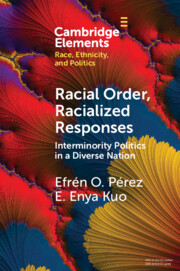This essay comments on three questions about race, ethnicity, and politics in the contemporary United States—How did we get here? Who are we now? And, where are we going next? I grapple with these questions as a political psychologist steeped in the study of intergroup politics. In this capacity, I will argue that structural (mis)calculations have paved the road toward present intergroup relations, where identity politics reigns supreme. I then discuss America's current racial landscape, arguing that reality is more complex than before, especially as it concerns political relations between Whites and non-Whites. In this regard, I will claim that political psychology holds special insights to generate new knowledge about how (non-)Whites are navigating this changing racial landscape. Finally, I will advocate, strongly, for a greater sense of wonder about the multiplicity of identities that people of color hold. In particular, I will claim that by relaxing our assumption that race is the main identity that matters to people of color, we stand to better appreciate just how adaptive non-Whites are to their political surroundings, leading us toward new insights about the origins and nature of mass political engagement and involvement.


